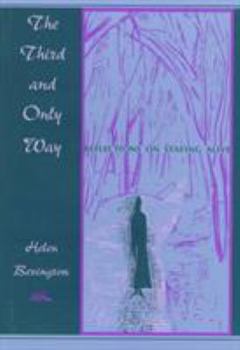The Third and Only Way: Reflections on Staying Alive
In this autobiographical volume, the remarkable Helen Bevington looks for answers to the question of how to live or, more specifically, how to confront growing older. A familiar face on the literary... This description may be from another edition of this product.
Format:Hardcover
Language:English
ISBN:0822318504
ISBN13:9780822318507
Release Date:October 1996
Publisher:Duke University Press
Length:224 Pages
Weight:1.20 lbs.
Dimensions:0.9" x 6.2" x 9.0"
Customer Reviews
2 ratings
My love was true...my patch of sky was splendid
Published by Thriftbooks.com User , 16 years ago
THE THIRD AND ONLY WAY, REFLECTIONS ON STAYING ALIVE by Helen Bevington, Duke University Press (Durham and London) 1996. Helen Bevington tells us early in the book, that it is the story of her resolution to live beyond solitude and despair. Early in life she determined to escape this destiny, to live a third way, even if not yet having found it or knowing where to look. Thus like Don Quijote answer to Sancho's "Where-to today?" she goes abreast: "That is as it may turn out." As it turns out, Helen writes all her life, ; and in this book as in some others, she writes just about anyone: writers, poets, famous and infamous figures in history , common and uncommon ways of life of men and women. We learn of St. Francis wearing bells on his sandals for the benefit of earthworms, of Ninon de Lenclos, the seventeenth century "grande cocotte" (or "grande horizontale" if you want) "her succession of lovers and valued friends...the Great Conde (with whom she spoke Latin in bed), La Rochefoucauld, the crippled poet Scarron, ...Saint Evremond, who loved her most of the seventeenth century and part of the eighteenth,...Moliere, (and the rumored turned down) Cardinal Richelieu.'' She tells us "that writing causes women to become oddly out of focus...recluses and spinsters of Victoria's time--Emily Bronte Christine Rossetti, Emily Dickinson--and deplore they hadn't become wives and mothers, healthy and well adjusted...The talented ones in our time too seemed out of sync, retiring souls living sheltered and unwed in a Southern town, like Eudora Welty; spinsters monstrously fat like Amy Lowell, fey like Marianne Moore, flaky like Edith Sitwell, mad like Gertrude Stein; women embattled like Mary McCarthy, oversexed like Erica Jong, suicidal like Virginia Woolfe, Sylvia Plath, Ann Sexton." Helen Bevington continues saying that she seems "to forget the reason for her writing at all. It is, she says, the only way (she) knows to escape the solitude that attacks (her), the fear of being without occupation, the terror of living for a lifetime alone. Through books and more books--always books to banish the clouds--you can begin to look more closely at someone else's life, where it is going and finally how it ends." This has been for her much of her "third way." She asks herself where has the search for a third way taken her? "By staying alive, what have I learned? To stand alone. To keep the forked end down (?)"... The third way may become the "third and only way," the mirvana of Buddha , the still center of Eliot or Yeats. "As for the obligation not to be unhappy, not even God manages that...For years I hated my solitude, having no talent for it, till it came to seem less a predicament than a company of one, nature's beneficent plan to set me free...of undue hope of a new dispensation, free not to care. Most of all, not to care." Then add this memorandum , Helen, Remindful of a world that ended: S
"It takes courage"
Published by Thriftbooks.com User , 23 years ago
Helen Bevington passed away in March 2001, a 94-year-old author and poet, who wrote a 1965 memoir, "Charley Smith's Girl," that included details about love affairs in the rural Otsego County town where she grew up. One of these affairs involved her father, Charley, a Methodist minister. The book was controversial enough to be banned in 1965 by the Worcester Free Library. Knowing this, "The Third and Only Way" speaks to the courage of her mother, "who survived without lament", compared to her father, who lived a life of despair. Bevington assures us through her vignettes of uncommon women like Simone de beauvoir, Virginia Woolf, Beatrix Potter and many others. She demonstrates there is a third and more hopeful way to live one's life, deviating from that portended by one's family. A compelling read, her lyrical style is mesmerizing and wrought with lots of tabloid details.





